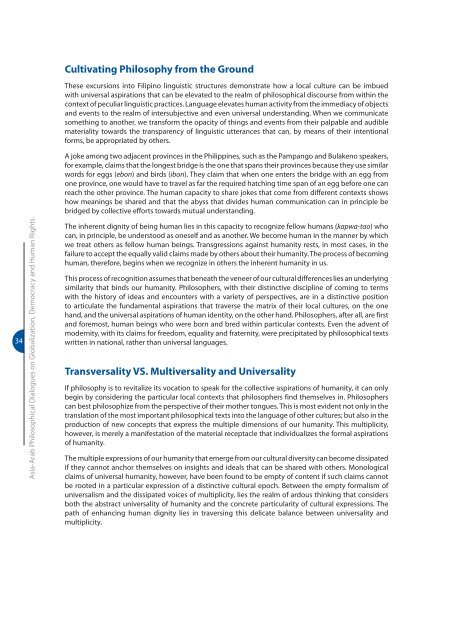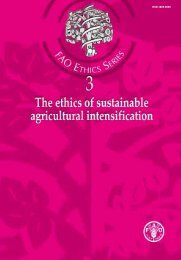Asian-Arab philosophical dialogues on globalization, democracy ...
Asian-Arab philosophical dialogues on globalization, democracy ...
Asian-Arab philosophical dialogues on globalization, democracy ...
Create successful ePaper yourself
Turn your PDF publications into a flip-book with our unique Google optimized e-Paper software.
Cultivating Philosophy from the Ground<br />
These excursi<strong>on</strong>s into Filipino linguistic structures dem<strong>on</strong>strate how a local culture can be imbued<br />
with universal aspirati<strong>on</strong>s that can be elevated to the realm of <str<strong>on</strong>g>philosophical</str<strong>on</strong>g> discourse from within the<br />
c<strong>on</strong>text of peculiar linguistic practices. Language elevates human activity from the immediacy of objects<br />
and events to the realm of intersubjective and even universal understanding. When we communicate<br />
something to another, we transform the opacity of things and events from their palpable and audible<br />
materiality towards the transparency of linguistic utterances that can, by means of their intenti<strong>on</strong>al<br />
forms, be appropriated by others.<br />
A joke am<strong>on</strong>g two adjacent provinces in the Philippines, such as the Pampango and Bulakeno speakers,<br />
for example, claims that the l<strong>on</strong>gest bridge is the <strong>on</strong>e that spans their provinces because they use similar<br />
words for eggs (eb<strong>on</strong>) and birds (ib<strong>on</strong>). They claim that when <strong>on</strong>e enters the bridge with an egg from<br />
<strong>on</strong>e province, <strong>on</strong>e would have to travel as far the required hatching time span of an egg before <strong>on</strong>e can<br />
reach the other province. The human capacity to share jokes that come from different c<strong>on</strong>texts shows<br />
how meanings be shared and that the abyss that divides human communicati<strong>on</strong> can in principle be<br />
bridged by collective efforts towards mutual understanding.<br />
34<br />
Asia-<str<strong>on</strong>g>Arab</str<strong>on</strong>g> Philosophical Dialogues <strong>on</strong> Globalizati<strong>on</strong>, Democracy and Human Rights<br />
The inherent dignity of being human lies in this capacity to recognize fellow humans (kapwa-tao) who<br />
can, in principle, be understood as <strong>on</strong>eself and as another. We become human in the manner by which<br />
we treat others as fellow human beings. Transgressi<strong>on</strong>s against humanity rests, in most cases, in the<br />
failure to accept the equally valid claims made by others about their humanity. The process of becoming<br />
human, therefore, begins when we recognize in others the inherent humanity in us.<br />
This process of recogniti<strong>on</strong> assumes that beneath the veneer of our cultural differences lies an underlying<br />
similarity that binds our humanity. Philosophers, with their distinctive discipline of coming to terms<br />
with the history of ideas and encounters with a variety of perspectives, are in a distinctive positi<strong>on</strong><br />
to articulate the fundamental aspirati<strong>on</strong>s that traverse the matrix of their local cultures, <strong>on</strong> the <strong>on</strong>e<br />
hand, and the universal aspirati<strong>on</strong>s of human identity, <strong>on</strong> the other hand. Philosophers, after all, are first<br />
and foremost, human beings who were born and bred within particular c<strong>on</strong>texts. Even the advent of<br />
modernity, with its claims for freedom, equality and fraternity, were precipitated by <str<strong>on</strong>g>philosophical</str<strong>on</strong>g> texts<br />
written in nati<strong>on</strong>al, rather than universal languages.<br />
Transversality VS. Multiversality and Universality<br />
If philosophy is to revitalize its vocati<strong>on</strong> to speak for the collective aspirati<strong>on</strong>s of humanity, it can <strong>on</strong>ly<br />
begin by c<strong>on</strong>sidering the particular local c<strong>on</strong>texts that philosophers find themselves in. Philosophers<br />
can best philosophize from the perspective of their mother t<strong>on</strong>gues. This is most evident not <strong>on</strong>ly in the<br />
translati<strong>on</strong> of the most important <str<strong>on</strong>g>philosophical</str<strong>on</strong>g> texts into the language of other cultures; but also in the<br />
producti<strong>on</strong> of new c<strong>on</strong>cepts that express the multiple dimensi<strong>on</strong>s of our humanity. This multiplicity,<br />
however, is merely a manifestati<strong>on</strong> of the material receptacle that individualizes the formal aspirati<strong>on</strong>s<br />
of humanity.<br />
The multiple expressi<strong>on</strong>s of our humanity that emerge from our cultural diversity can become dissipated<br />
if they cannot anchor themselves <strong>on</strong> insights and ideals that can be shared with others. M<strong>on</strong>ological<br />
claims of universal humanity, however, have been found to be empty of c<strong>on</strong>tent if such claims cannot<br />
be rooted in a particular expressi<strong>on</strong> of a distinctive cultural epoch. Between the empty formalism of<br />
universalism and the dissipated voices of multiplicity, lies the realm of ardous thinking that c<strong>on</strong>siders<br />
both the abstract universality of humanity and the c<strong>on</strong>crete particularity of cultural expressi<strong>on</strong>s. The<br />
path of enhancing human dignity lies in traversing this delicate balance between universality and<br />
multiplicity.

















